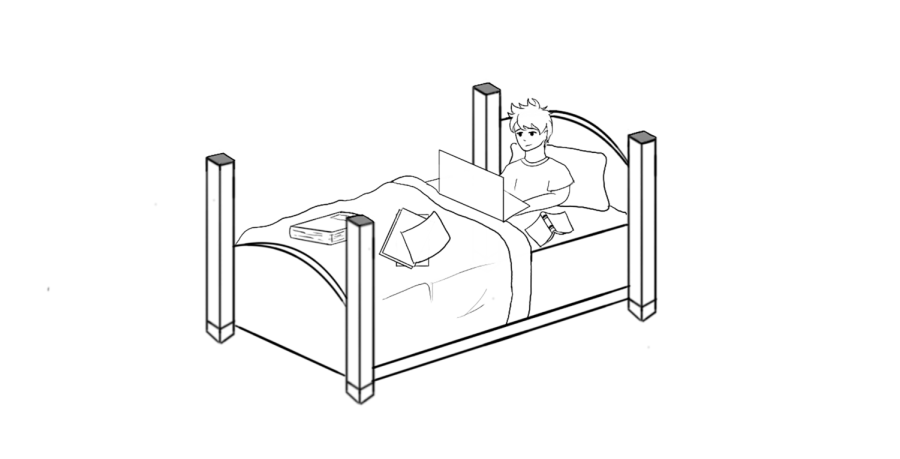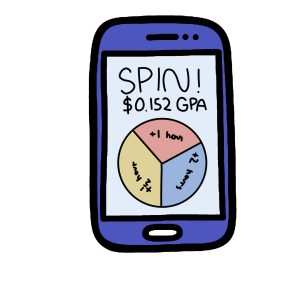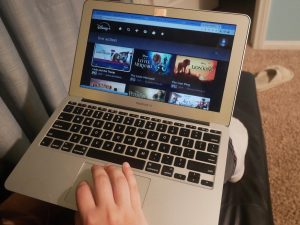The perfect fit
Discussion of working on a bed or at a desk
Student doing homework while laying on their bed at home. Some students at BVH may prefer working on a bed rather than a desk.
February 9, 2022
After a long day of school, students and teachers return home to rest and prepare for the following day. They may have responsibilities to tend to, such as homework and the preparation of lessons. Though, in order to get tasks done efficiently, a workplace is needed. While many people prefer to work at a desk, some people like to work in bed. The setting of the workplace is a preference that differs from person to person depending on what functions best for them.
For English 10 Accelerated teacher Sean Warlop, a desk is his preferred work area. He stated that a desk has more benefits as it provides a greater amount of space and poses less distractions compared to a bed.
“I prefer to work at a desk. A bed is not conducive to do all the work that comes with my job [as an English teacher],” Warlop said.
Similarly, junior Vivian Nguyen prefers to work at her desk, mentioning that she only does work on her bed when she’s sick or tired. She explains that the preference of her desk is due to the comfort of her seat that is provided as she works.
“I personally prefer working at a desk because I have the most comfortable seat in the world. It’s a perfect balance between soft and comfortable, but [the seat is] also stiff because you have the stiff board you lean against,” Nguyen said.
On the contrary, there are those who prefer to move their working space to the bed. Junior Giselle Geering completes her studies in bed because she does not have a desk available in her room. Despite the reasoning behind having to work on a bed, she expressed her positive insight.
“It’s not like I wanted to sit on my bed. In my house, it’s really crowded and loud because I’m one of six children, so there’s not a place I can go where it’s quiet except for my room,” Geering said. “I think a major benefit of it is that you have a lot of freedom to move around, lay out your stuff and it’s comfortable.”
Though both Geering and Nguyen have different preferences on where they work, both juniors agree that anyone can work where they see fit for themselves. Nguyen expressed her acknowledgement on the idea that the location of workspace depends on the individual and their environment.
“I think you should work at a desk if you have the option to, but some people don’t have the space to do that or the luxury. I believe that it’s a good idea to establish a working space [fit] for you,” Nguyen said.
Warlop, Geering, and Nguyen have commonly stated that distractions are inevitable when working, but are not based on where or what the workplace is. Instead, they depend on the environment of the area and what things could lead to a distraction.
“Of course people get distracted from time to time, but as I work at my desk there are a plethora of things I could do. Conversely, working [in] bed means I am at home and all the [obstacles] that come with that,” Warlop said.
Obstacles can disturb the flow and overall completion of work. Geering shared that at certain times, her family may become a distraction, especially her younger siblings. She furthers that working on her bed is not what truly distracts her.
“[I’m not distracted] by the fact that I’m on my bed, [but] my brothers [can] come into my room anyways and distract me,” Geering said.
Furthermore, Nguyen brought up the possibility of objects being more of a distraction than people. Being led off track could be a result of what surrounds the workplace (pencils, phones, fidget toys) rather than the noise and people nearby.
“If you decorate your desk and you have accessible distractions around [the] desk, such as food, books or devices that are nearby, I think that’s more of an issue than the actual space,” Nguyen said. “It’s more [dependent on] the kind of things around you.”
Nguyen shared a personal experience of a distraction with her phone that usually rests close by as she works. She explains that when a message comes through she goes into a “rabbit hole” of answering messages, leading to another “rabbit hole” of activities.
Due to the cons found from completing work in bed, Nguyen and Warlop have high preferences of working at desks.
“If I were to work [in] bed it would be less efficient than working at a desk,” Warlop said. “I imagine working in bed would be uncomfortable. I would also not have all of my resources next to me [on a bed] as I would have in the drawers of the desk. Not to mention the vast [and] hard work surface a desk offers.”
As for Nguyen, she claims her productivity and efficiency wouldn’t falter, but rather her energy would decrease as the day goes on.
“My physical being would be drained because oftentimes, I find it hard to not slouch when I’m doing work on a bed, and that often causes my back to strain and ache,” Nguyen said.
No matter if the workplace is a desk or bed, students, teachers and any others are free to choose a space where they can complete their tasks and achieve their goals. The area in which one decides to dedicate as a workplace is up to what works best for them.
“I think it’s more of a mental thing. If you’re committed to getting your work done, you’re going to get it done no matter where you’re doing it,” Geering said.










